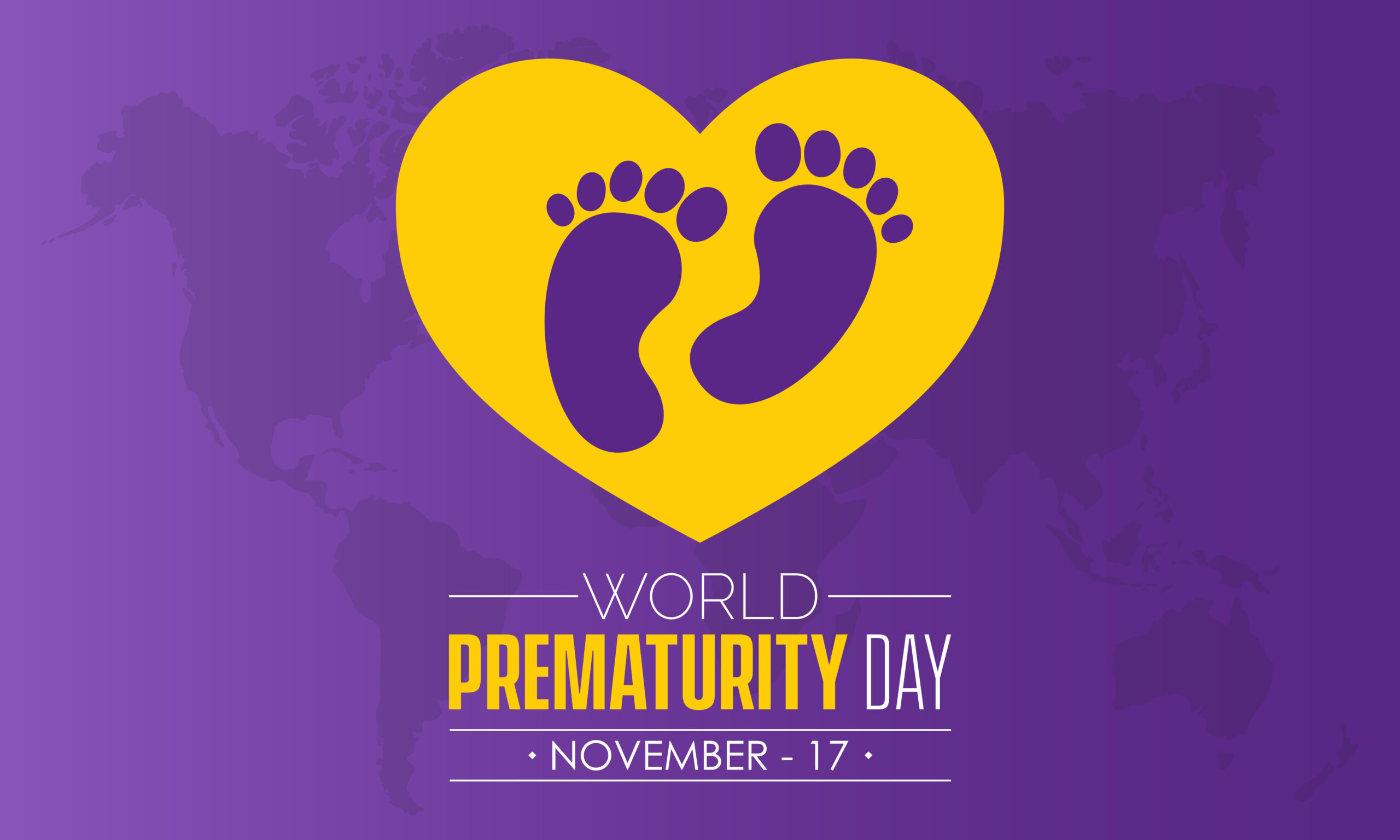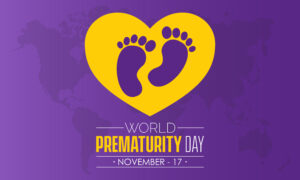
by Jobyna McCarthy, Family Committee Member
November 14, 2023
Content Advisory: Infant Loss
I gave birth to 2 preemies; my second preemie Quinn, now 17-years old, was born at 28 weeks gestation (or 2 months early!), weighing 2 pounds, 10.7 ounces. For unknown reasons, I went into preterm labor which couldn’t be stopped, and was sent into an emergency C-section due to a prolapsed umbilical cord. Quinn was intubated immediately, but after only a day, was breathing on his own. However, at one week old, and only weighing 3 pounds, he underwent surgery, one very common to premature infants called patent ductus arteriosus (PDA) ligation. This duct in their heart closes in full term infants, but often stays open in preemies. The surgeon, by going through Quinn’s back and ribs, gently pushed aside his tiny left shoulder blade and lung, and closed with 2 metal clamps, the duct in his heart which remained open. This brilliant surgeon has performed this surgery on hundreds of preemies; it was no big deal to her. To this mama however, sending my barely 3-pound baby “under the knife”, was terrifying. After a “simple” surgery and care by the nurses I was certain were sent directly from heaven, Quinn was ready to thrive!
Preemies in the neonatal intensive care unit (NICU) usually stay the duration of their gestation. For Quinn, that meant his stay would be around 2 months. During that time, preemies simply need to eat and gain weight, while living partially in an incubator, and the other time in an open-air crib. Eat and grow, sure, but they also need to breathe. Obviously. But preemies wouldn’t have to be breathing if they were still in the womb, so often they just don’t. They just randomly quit breathing. Often, we’d be holding Quinn in the NICU, skin to skin, or kangaroo care, and Quinn would just quit breathing. All the alarms he was hooked up to would start blaring, and his nurses would rush over, and rub his back or sternum, and he’d start breathing again. Another “no big deal” type situation, right? UGH. It happened so often, during those early weeks in the NICU, that I tried to get used to it, but there was that one time. I looked down and Quinn was blue. The alarms were going off, and the nurse grabbed him from me, vigorously rubbed him, but then “bagged” him, meaning she used a face mask to inflate his lungs, to immediately get oxygen to his brain. He turned pink again, and was back to “normal” but this mama was not, in fact, back to normal. I left in a panic and said I wasn’t coming back until they could guarantee that wouldn’t happen again. (Trauma makes you do and say odd things, doesn’t it?!) I was back the next hour, holding him again, skin to skin.
Soon Quinn was healthy and “fat” enough to maintain his own body heat, and he came home at 58 days old, weighing 5 pounds. Quinn was monitored for 5 years by child development specialists, as preemies often miss their development milestones, and if caught early, helpful interventions can be implemented. Quinn “graduated” with a clean bill of health at 5 years, and other than the scar on his back from the PDA ligation, he experiences no complications from his premature birth.
12 years before Quinn, I gave birth to my first preemie, Tyler. I was 17, just graduated from high school, and excited to attend an out of state college on an athletic scholarship. I was a fit athlete, but with an irregular period, and bleeding every month, which was possibly early pregnancy complications. Only finally when my jeans were too tight, and my belly rock hard, did I seek testing. An ultrasound confirmed I was 5 to 6 months pregnant. Shockingly, the next day, I went into labor. Pumped full of medications attempting to slow or stop my labor, it was for naught. Tyler arrived at 1 pound, 5 ounces. It was 1994, and the United States had just received FDA approval for the use of surfactant in premature babies’ lungs, but we, in rural Montana, either did not have access to it or the choice was made not to use it or there just wasn’t enough time. Without surfactant, the alveoli in Tyler’s lungs simply could not inflate, he could not breathe, and we lost him immediately after birth.

Because I was a still a teenager, poised to fly off to college, this loss was treated by everyone around me as it was “for the best” and that “I had my whole life ahead of me” and “God knew what I needed.” I also received societal messages, sharing the sentiment of shame of unmarried teen pregnancy. After the small family graveside services, I was sent off to college with less than a month to heal from this trauma. I was alone. Nobody to grieve with. Sure, I was referred to a grieving moms of infant loss group, but there were zero teenagers in those groups. Again, I was floating in the sentiments that it was for the best, or God knows best and at least your shameful ways have been buried. There was no deep work through the trauma of infant loss, and the shame of teenage pregnancy. I was still a child.
This country has a very difficult time talking about death. We are afraid of it, and we have no clue how to talk about it. To this day, I still experience isolation and loneliness. My family never mentions Tyler; that only I remember his birth and anniversary day. I continue to grieve alone. Recently I was spoke of these woes of isolation and dismissal with a dear friend. She stated that I get to dictate how I want to grieve and to celebrate and suggested that instead of being upset every year that I could take a mini vacation to celebrate Tyler’s life, grieve the memories I will never create with Tyler, grieve the dismissal of family that Tyler existed, and make the day and week exactly how I want it. This was an absolute lightbulb moment. I am in charge of how I deal with my emotions and grief, and THAT IS EMPOWERING! I used to dread Tyler’s anniversary, now I get to look forward to his special day and week.
Regarding healing, resiliency, and general wellness, I cannot say enough about a good therapist. A LOT of talk therapy with many different modalities. Therapists over the years have done great work of course working through my trauma of losing a child and being dismissed by family and friends, but further, untangling the shame around the stigma that only “bad” teenagers get pregnant. Shame helps no one and my teen self, deserved love, understanding, and physical and mental healthcare, instead I was judged and discarded.
I also have created cherished communities of joy – around art, sports and hiking, and my trusted friends, all who love, accept, and adore me for who I am.
Sometimes you are the only person that can help you, and you must keep seeking your self-care, with movement, medicine, and all the different modalities of therapy. Other times, sharing with a trusted human can give you just the breakthrough you need. There is NO shame in being a teenage mom.
Humans are capable of procreation and bringing life into this world in their teenage years, and its solid public health to educate our kids, ensure our youth don’t become pregnant before they’re ready. Further, if an adolescent is impregnated, we should withhold judgment and help them, not cast stones and turn our backs. Shame has never been an effective public health tool; shame only demeans and destroys.
Can you help me in my goal to reduce stigma around teenage pregnancies? We don’t deserve the judgment heaped upon us, nor do we deserve to be tossed aside as sinners with a Scarlett letter. It is deeply damaging to our psyche, and then we’re overwhelmed use unhealthy coping methods. For a decade, I drowned my sorrows and shame in alcohol, which was both dangerous to me and to my communities.
How are we today? Well as I said earlier, 17 years ago, Quinn, born 2 months early, was given the surfactant that wasn’t available to Tyler, and was able to breathe on his own shortly after birth. Quinn is in high school, taller than I, and has dreams of going to medical school. The advances in modern medicine and solid public health and prenatal care, should not be a just a privilege to the wealthy, in urban populations, but available to all regardless of race, religion, gender, sex, and age. We will be a better society because of it, and our babies deserve this.
World Prematurity Day, November 17th, is a day to raise awareness around the globe of the devastating effects prematurity can have on families, and to ensure every baby has the best possible start in life.

